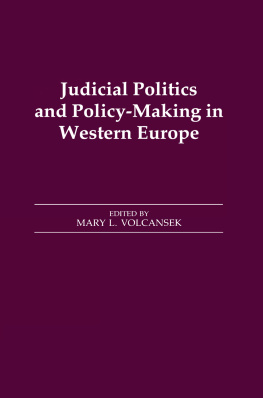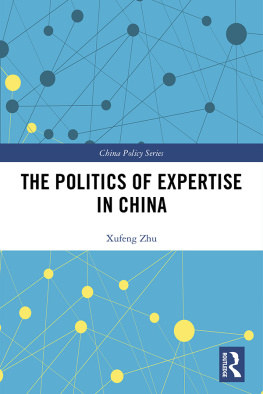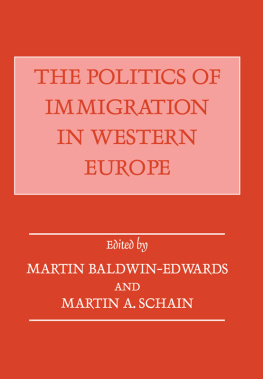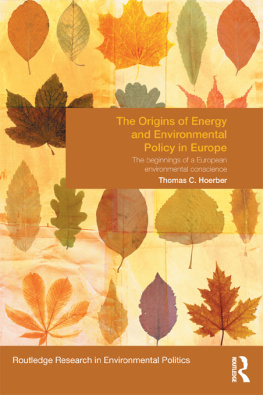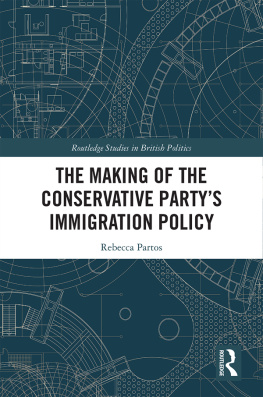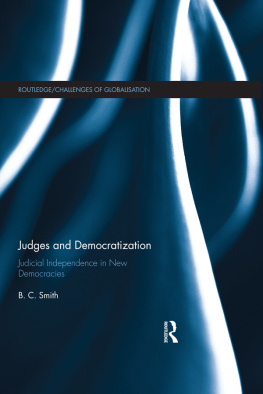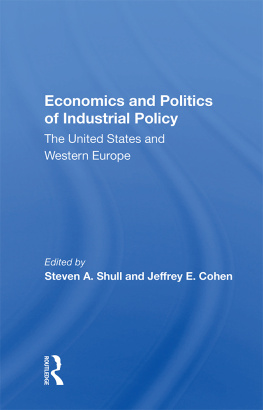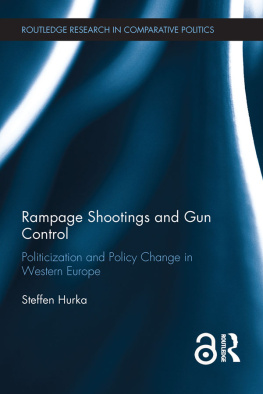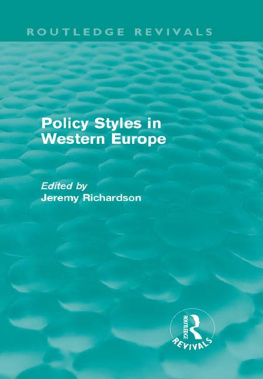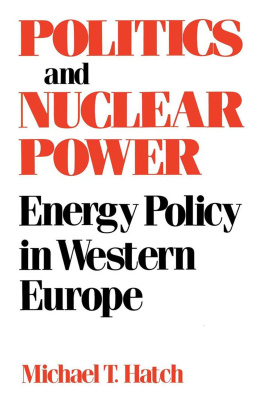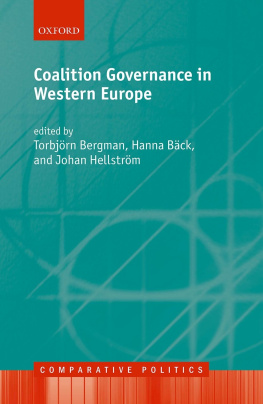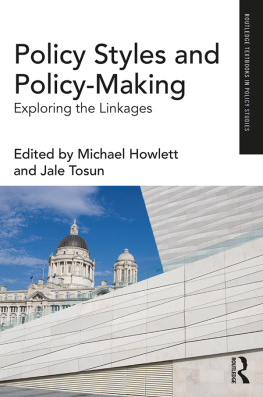JUDICIAL POLITICS AND POLICY-MAKING IN WESTERN EUROPE
JUDICIAL POLITICS AND POLICY-MAKING IN WESTERN EUROPE
Edited by
MARY L. VOLCANSEK
First published 1992 by
FRANK CASS & CO. LTD
Published 2013 by Routledge
2 Park Square, Milton Park, Abingdon, Oxon OX14 4RN
711 Third Avenue, New York, NY, 10017, USA
Routledge is an imprint of the Taylor & Francis Group, an informa business
Copyright 1992
British Library Cataloguing in Publication Data
Judicial Politics and Policy-making in Western Europe. (Journal of West European Politics Series, ISSN 01402382)
I. Volcansek, Mary L. II. Series
344.071
Library of Congress Cataloging-in-Publication Data
Judicial politics and policy-making in Western Europe / edited by Mary L. Volcansek.
p. cm.
First appeared in a special issue of West European politics, vol. 1, no. 3, July 1992T.p. verso.
Includes bibliographical references and index.
1. Judicial processEurope. 2. Political questions and judicial powerEurope. I. Volcansek, Mary L., 1948
KJC3666.J8 1992
347.401dc20
[344.071]
9225752
CIP
ISBN 13: 978-0-714-63462-3 (hbk)
This group of studies first appeared in a Special Issue on Judicial Politics and Policy-Making in Western Europe of West European Politics, Vol. 15, No. 3 (July 1992), published by Frank Cass & Co. Ltd.
All rights reserved. No part of this publication may be reproduced in any form or by any means, electronic, mechanical, photocopying, recording or otherwise, without the prior permission of the publisher.
Typeset by Florencetype, Kewstoke, Avon
TO TIM AND LIZ
Contents
Mary L. Volcansek
Gavin Drewry
Alec Stone
Christine Landfried
Maria Elisabetta de Franciscis and Rosella Zannini
Peter J. van Koppen
Ivan Verougstraete
Mary L. Volcansek
Andr Bzdera
John F. Stack, Jr.
Andr Bzdera is a research assistant in politics at the University of Montreal. His recent work has centred on the comparative study of judicial review in federal and quasi-federal states.
Maria Elisabetta de Franciscis received her laurea from the University of Naples and her Ph.D. from the University of Connecticut. She is a lecturer at the Facolt di Scienze Politiche in Naples and teaches at Trinity College's Rome Campus. She has published Italy and the Vatican: The 1984 Concordat between Church and State (Bern: Peter Lang, 1989) and essays on Italian politics.
Gavin Drewry is Professor of Public Administration, University of London, and Director of the Centre for Political Studies, Royal Holloway and Bedford New College. He is Research Adviser to the Royal Institute of Public Administration. He has written extensively on the judicial process, public law, legislation and parliament.
Christine Landfried is Professor of Comparative Government at Hamburg University. She has written Bundesverfassungsgericht und Gesetzgeber and Parteifinanzen und politische Macht and edited Constitutional Review and Legislation (Baden-Baden: Nomos, 1988).
John F. Stack is Professor of Political Science at Florida International University. He wrote International Conflict in an American City: Boston's Irish, Italians and Jews, 193544 and edited Ethnic Identities in a Transnational World and The Primordial Challenge: Ethnicity in the Modern World. He has published articles on the linkages between ethnicity and world politics, with a special emphasis on ethnic conflict in Miami. Since completing a J.D. degree, he has begun research on the role of legal institutions in world politics.
Alec Stone is Assistant Professor of Political Science at the University of California at Irvine. He has written The Birth of Judicial Politics in France (New York: OUP, 1992) and articles on French courts and French politics. He is currently working on judicial-political confrontation in Germany, France and Spain.
Peter von Koppen is a psychologist at the Faculty of Law of the Erasmus University Rotterdam in the Netherlands. He has published on the psychology of judicial decision-making (Determinanten van Privaatrechteliijke Beslissingen), co-authored Tot Raadshee Benoemd: Anderhalve Eeuw Benoemingen in de Hoge Raad der Nederlanden and co-edited Lawyers on Psychology and Psychologists on Law and De Menseliijke Factor: Psychologie voor Juristen, in addition to articles on law and psychology.
Ivan Verougstraete received his law degree from the University of Louvain and his LLM from Columbia University. He is a Belgian barrister and was Clerk of the Court of Justice of the European Community before entering the Belgian judiciary. He now serves on the Belgian Cour de Cassation and edits the Revue de Droit Commercial Belge. He has written books and articles on European, commercial, procedural and cvil law.
Mary L. Volcansek is Professor of Political Science at Florida International University. She has written Judicial Politics in Europe: An Impact Analysis (Bern: Peter Lang, 1986) and Judicial Impeachment: None Called for Justice (Chicago: Univ. of Illinois Press, 1992) and co-authored Judicial Selection: The Cross-Evolution of French and American Practices (Westport, CT: Greenwood Press, 1987). She has also published articles on judicial behaviour in the United States, Italy and the European Community.
Rosella Zannini is Assistant Professor of Comparative and Italian Constitution Law at the Facolta di Scienze Politiche of the Universita degli Studi di Napoli, Federico II.
MARY L. VOLCANSEK
The logic and simplicity of turning to an objective third party to resolve conflicts, when two disagreeing parties cannot, is so compelling that courts have become a universal phenomenon.1 No one seriously argues with this function of courts, and, indeed, when conflict resolution is believed to be impartial and objective, judicial authority is accorded substantial legitimacy. The exercise of judicial power is not usually challenged even when courts become vehicles for the maintenance of order and the distribution of rewards. When judges, however, are seen as law makers, the consensus that upholds judicial legitimacy is far less solid. This volume is an examination of how a number of European courts, both national and supranational, engage in law-making (or, more euphemistically, how they make policy) and reactions to their activity.
The credibility of courts and court decisions traditionally rested on the myth that judges had no discretion in rendering decisions, that judicial mandates followed the simple formula of R (Rules) F (Facts) = D (Decision).2 The American realist school largely debunked that myth, and European scholars have likewise rejected the notion that judges are no more than la bouche de la loi (the mouth of the law). That courts make policies through even the simple act of choosing among competing interpretations is now widely accepted. That they often do far more is also not in doubt.
Judicial policy-making has been defined in various ways, but few would disagree with the Grossman and Tanenhaus assertion that it is the factor that punctuates the role of courts in the political system, for judicial decisions are frequently crucial catalysts directing social change, in part because men have long articulated the means and ends of their common existence through law.3 Undoubtedly, most of what courts do is not political, and policy implications extend no further than the parties to a case, unless the remedy selected or the method of reaching it is novel and adopted by judges in other jurisdictions. Policy-making by courts, instead, occurs when the case involves choice and judgment, when judges are called upon to select from among competing rules, interpret new ones, or act in the absence of clearly articulated executive, legislative or constitutional norms. Judicial policy-making, therefore, does not necessarily imply that courts are usurping the powers of other government institutions and frankly could only be totally eliminated if those drafting laws wrote wholly unambiguous ones and left no possible contingency uncovered.4 Of necessity, judges also make policy when they write on a clean slate, in addressing a new legal question or interpreting a new rule.5 They are likewise policy-makers when asked to be problem solvers and, consciously or unconsciously, cause change in society. Even the decision not to decide or to support the status quo can constitute a policy choice, for it lends legitimacy to existing conditions.


